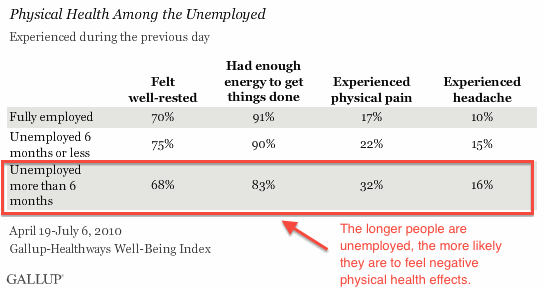It’s no secret: The health of a nation’s economy affects the health of its population.
There is a direct correlation between poverty and lack of access to health care. As the sickly economy causes a rise in joblessness, it also causes a rise in poverty. And people who live in poverty experience ailments directly associated with their socio-economic status. For example, people who live below the poverty line are especially susceptible to nutrition-related diseases such as obesity, high blood pressure, and diabetes.
Young men who work in labor-intensive fields particularly suffer when they lose their jobs. Even when these men attempt to stay active during unemployment, they still produce less physical exertion that they did while working in fields such as construction.
Also, financial woes caused by unemployment and economic perils cause stress, which over a prolonged period can cause health problems, and even a shortened life span.
Similarly, unemployment affects a person’s morale, which can manifest in physical symptoms, all of which seem to increase as the period of unemployment lengthens:
The scope of people affected (either mentally or physically) by the economy must be vast, because the internet abounds with advice and coping mechanisms:
- Join a cheap gym and watch what you eat.
- Don’t watch the stock market every day and foster your relationships.
- Change your attitude about your situation.
There is also a link between joblessness and lack of health insurance. Most people depend upon their employers for health benefits. People who are unemployed usually cannot afford to pay for the full cost of health care services, and their health often deteriorates as a result.
Even people with health insurance may skip seeking medical treatment to avoid copays and prescription costs:
It’s no wonder, then, that so many people believe that health care policy and economic policy are intrinsically linked. A strong economy leads to quality health care, which leads to healthy workers, which leads to business growth, which keeps the economy strong:
Similarly, experts like Harvard professor William C. Hsiao believe that universal access to adequate health care will help stimulate the US economy.
Some “tweeps” express similar sentiments:
Economists and politicians can track GDP, and unemployment, and job formation as ways to assess the health of the economy. But the answer could easily rest in one simple question: “How are you feeling?”






There is, I regret to say, a technical term for “tweeter”– “tweep.” Barbara Gray was throwing it around like nobody’s business during her social media presentation. It sounds a little too much like “twerp” for my liking.